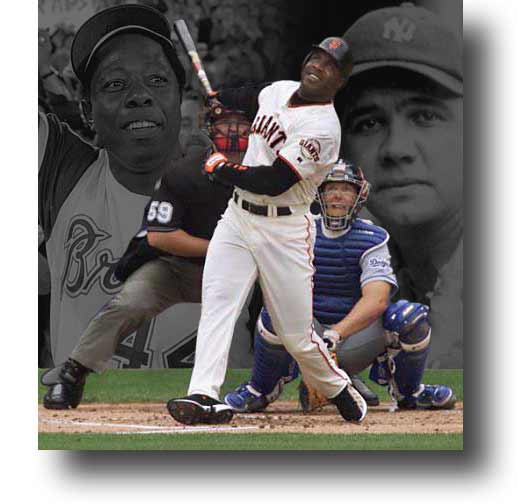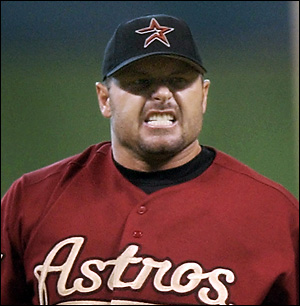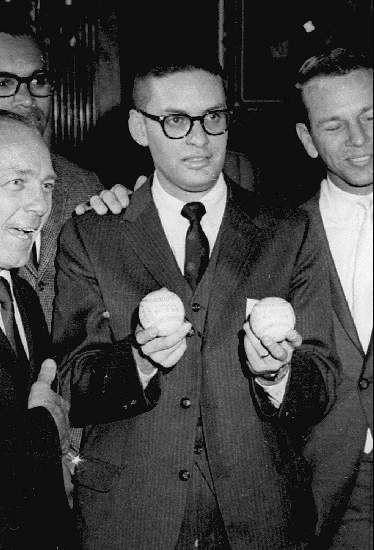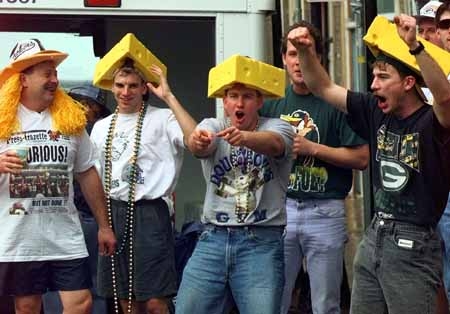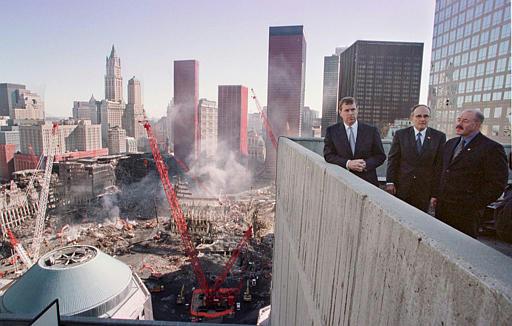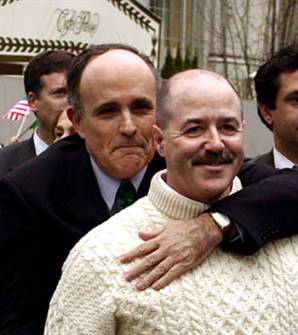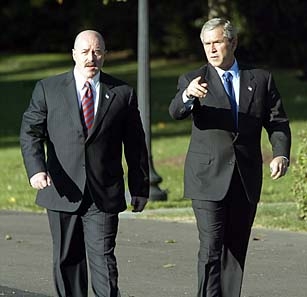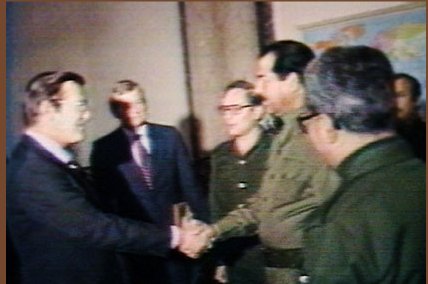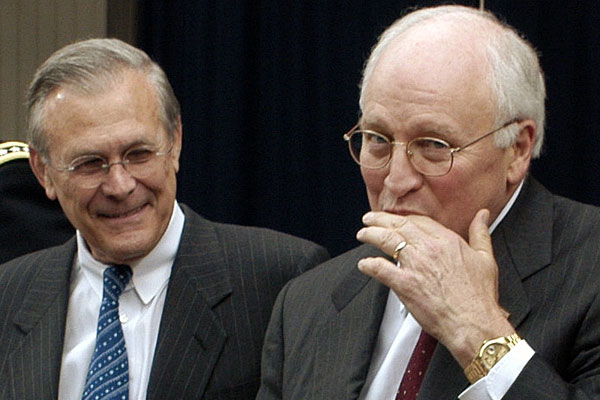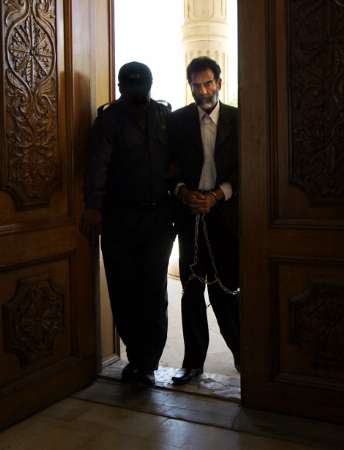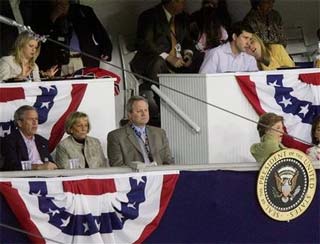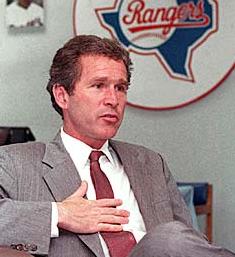Today, the federal government brought an indictment (bonds_indictment_111507.pdf) against Major League Baseball player and former San Francisco Giant Barry Lamar Bonds. The indictment alleges that Bonds committed perjury and obstructed justice. It contains five counts and a maximum sentence of 30 years. News outlets are also reporting that Bonds’ trainer, Greg Anderson, has been released from jail. Oddly enough, I’m not sure that was the biggest baseball news of the day.
(Isn’t anyone even going to ask? rocket@fatragehead.com?)
In other news, Major League Baseball, a $6 billion business enterprise, is in the best financial shape in its history. The Associated Press reports today:
NAPLES, Fla. — Baseball revenue climbed to $6.075 billion this year, and commissioner Bud Selig envisions an even rosier financial future.
“As I told the clubs today, we’re on a great high here,” Selig said Thursday following the conclusion of a two-day meeting in which owners discussed, among other things, ways to speed up games.
“When you look at the final numbers and you see what’s happened, it’s remarkable. There are times, honestly, when I have to pinch myself to make sure all of this is happening. … Growth and revenue, growth and profitability; it’s just been really, really good.”
And with attendance up, and Major League Baseball also making a concerted effort to expose its product to other parts of the world, Selig is confident the game will continue the trend next season, and beyond.
“I’m putting myself on the spot here, but I’m very hopeful to draw 80 million-plus, and I think our revenues will continue to go up,” Selig said of 2008, later adding that he’s “very proud” of the growth.
“We started at $1.2 billion, and I can remember waking up in ’93 and ’94 and ’95 and thinking how are we ever going to get to $2 billion? So here we are at $6 billion, 75 million. And if we just keep doing our work, stay out of controversies, keep the focus on the field, we’ll get to numbers someday that will be stunning. And these are stunning.”
The commissioner said there was nothing new to report on talks to have the Los Angeles Dodgers and San Diego Padres play two exhibition games in Beijing in March, a recommendation that instant replay be used to help umpires with some calls, or George Mitchell’s investigation into performance-enhancing drugs in baseball. Selig still expects Mitchell’s report to be released before the end of the year.
Owners heard a presentation on pace of games from Jimmie Lee Solomon, executive vice president for baseball operations in the commissioner’s office.
Solomon said last week during general managers meetings in Orlando that to speed up games, baseball was considering limiting when a hitter could step out of the batter’s box between pitches, restricting the number of times a player could visit the mound, and limiting the number of players allowed to visit the mound.
“Obviously I have a lot of concern about the length of our World Series games, playoff games, regular-season games,” Selig said. “We’re going to work on that over the course of the winter.”
In addition to enforcing existing rules, the commissioner said consideration will be given to adding new rules.
“We just need to speed things up a little bit for everybody’s best interest,” Selig said.
Baby Bud in 1968 after his purchase of the Seattle Pilots. Bud relocated the team to Milwaukee and name them after the heroes of the local community — drug dealers, I mean “Brewers.” Milwaukee ranked No. 1 as Forbes’ Drunkest City in America. “Milwaukee is a preferred site for clinical trials concerning alcohol abuse and dependence because the region has a large population of heavy drinkers, according to the NIAAA.” Not even Laverne and Shirley could put a spin on that one. In Milwaukee, it’s so bad newspapers identify the brand of beer criminals use in the commission of crimes.
————————————————————
Somewhere in my education, I learned that whenever a huge news story broke that I should ignore that big story and look for a financial or military or political story that received considerably less attention. I learned that I should look for these stories on Fridays and Saturdays because those were notoriously light news days. Over time, I’ve tried to remain true to this approach to fact gathering. Sometimes it pays off. Sometimes it doesn’t.
In this instance, what we have here is a crystal clear case of “positioning.” But this not the lone example. Drug dealers are positioned. There are acceptable zones for trafficking in vice and there are “Drug Free Zones.” Some are real, some are mythical.
“For two decades, policy-makers have mistakenly assumed that these statutes shield children from drug activity,” said report co-author Judith Greene, a New York-based researcher. “We found no evidence that drug-free zone laws protect children, but ample evidence that the laws hurt communities of color and contribute to mounting correctional costs.”
New Jersey’s sentencing review commission reached similar conclusions in December, when the panel — made up of state officials and criminal justice experts — found that students were involved in only 2 percent of the cases it examined. It said drug-free zones around schools, parks and housing projects cover virtually all of some cities, and 96 percent of offenders jailed for zone violations were black or Hispanic.
“When the overlap of zones in densely populated areas covers the entire city, the idea of special protection loses its meaning — people don’t know they’re in a school zone,” said Ben Barlyn, a deputy attorney general and executive director of the sentencing review panel. “It would be as if we made the entire New Jersey Turnpike a reduced speed zone.”
For example, in Washington Heights, the boyhood home of Major League Baseball star Manny Ramirez, police and politicians established an acceptable zone for narcotrafficking at the center of three major roadways to facilitate the purchase of drugs by affluent users. Manny’s old neighborhood is intersected by the West Side Highway leading to points south like the Upper West Side and Greenwich Village. It is cut by the Cross Bronx Expressway which spirits drivers to the safety of Westchester County in minutes. And, Washington Heights is split by entry roads to the George Washington Bridge connecting New York City and New Jersey. Drug dealers were “positioned” in this neighborhood, allowed to conduct street-level dealing within its confines, and precluded from exporting that traffic to regions closer to their primary user base. It is precisely this type of selective policing/prosecution which inspires the wrath of local residents subjected to the predations of local users and the territorial competition of local dealers. The “job” of law enforcement in instances such as this is to proscribe the range of activity – not to eliminate the business. Politicians provide cover by extolling the virtues of the NYPD and lamenting the overwhelming nature of the problem – the inexorable scourge of drugs. The media aligns to this agenda by showing “Perp Walks”.
 Ken Lay, former Enron executive and associate of President Bush, walking the walk after stealing the loot. Prior to kicking the boot.
Ken Lay, former Enron executive and associate of President Bush, walking the walk after stealing the loot. Prior to kicking the boot.
 Karl Rove, going in the other direction, but to the same place.
Karl Rove, going in the other direction, but to the same place.
Of course, perp walkers in the Heights don’t look like Lay and Rove, but the primary buyers look as if they could have come from their loins. They don’t ask tough questions about arrest rates, recidivism, user profiles or budgets for tangible resources in poor communities. They simply co-sign the song and dance of urban politics. Drug dealers graduate from their position as street level apprentices in the government-sponsored game of illegal drugs to the finishing schools of jail cells located in remote areas scattered across New York State. The dealers position as revenue generating pawns for low-level enterprises is seized by the apparatus of the state to provide the basis for a prison-construction-rural vote complex. This neat appropriation of labor by compulsory positioning is the cornerstone of America’s long-standing War on Drugs. Perhaps the most essential part of positioning, with respect to urban narco-trafficking is the proverbial “Dirty Cop.” As seen from the quote above, it is better to have a dirty policy, but a dirty cannot hurt until he gets caught. New York City had a dirty cop.
Here he is standing above the ruins of the World Trade Center with 2008 Presidential candidate Rudy Giuliani.
Here he is again, in a more intimate moment.
Here he is with President Bush, watching as W. points at something critical to homeland security.
But, this is not the only type of positioning. Saddam Hussein was “positioned” – and he was told that he had a “No Fly Zone” in his own hood, er, nation. For all the talk of “dictator this” and “dictator that,” the best term to describe Saddam Hussein from 1980 through 1988 was “ally.” Hussein was an ally of the United States who worked in close cooperation with Washington. After all, Iraq fought an 8 year war against Iran – only to see both nations lined up like dominoes. Hussein was positioned to invade Kuwait when he received a wink and a nod from a United States Ambassador after he announced his criteria for forestalling an invasion of that particular invention of the British. The transcript of Hussein’s conversation with the diplomat would have been damning if the American public had been paying attention. Rest assured…consolidated corporate media which always co-signs Washington prerogatives went along for the ride. Over time, images of gassed Kurds, much like images of victims of drive-by shootings, would be trotted out as a means to take what might be termed corrective action. Before being run out of Washington, former Secretary of Defense plotted Saddam Hussein’s perp walk (see below). And Hussein, the former ally, wound up at the end of a rope – like so many drug dealers who preferred death to iron cells. Saddam was positioned to provide a pretext for a U.S. invasion which had been conceived long before his decision to cross the border.
And when you want to “position” a head of state and former ally, it can’t hurt to have a dirty cop.
Donald Rumsfeld greets an ally.
Sometimes, if it’s a really big job you’ll need two dirty cops.
Remember Saddam’s perp walk?
They say you cannot steal from an honest man. This world of ours is full of dishonest men – some are greedy, some are liars. Another man once said, “Why callest thou me good? There is none good but the Father.” It is in this world that boys come of age playing games and looking for positions on a diamond. Children do not run between the lines with visions of $275 million contracts. They can scarcely conceive of how much money that might be. Their parents can scarcely conceive of how to spend such a sum.
In the mid-1990’s, Major League Baseball had a problem. Fans were not turning out for games. There was labor unrest. The Montreal Expos, under Felipe Alou and the New York Yankees under Buck Showalter lost a once in a lifetime opportunity to win the World Series. The game was in the midst of being displaced by the NFL and the NBA as the sports of choice for all Americans. Pete Rose and his allegations of gambling were omnipresent. Somewhere along the line, some marketing genius (or ambitious intern with common sense) figured out that the best way to reinvigorate this sleepy game was to increase the number of home runs hit across the league. That tale has been well-documented. I will not recount it in full here. As Selig sobbed into his piss poor beer about the mere $1 billion in league coffers, the production of players had stabilized. The game’s best players in the early 90’s – Barry Bonds, Ken Griffey, Jr. and others were putting up consistent, predictable numbers and the excitement of great catches in center field and brilliant base running was insufficient to lift the game. Even a World Series win by the New York Yankees over Ted Turner’s All-Americans (aka The Atlanta Trail of Tears Braves) was not the right elixir. The resurrection of the game would not happen until the Home Run Summer of 1998. It was Mark McGwire and Sammy Sosa leading an epic chase into history (Babe Ruth) which brought the game back. Cal Ripken’s pursuit of history (Lou Gehrig) was of near equal import. Back in 1998, the league and the media gave a wink and a nod to steroid use by players. Bud Selig and the owners did their best impersonation of Ambassador April Glaspie and encouraged players, architects, grounds crews, ball manufacturers and bat manufacturers to do their level best to increase the number of home runs in baseball. They even enlisted the support of governors and mayors across the nation to expand the sport and dilute the quality of pitching. At the end of that season, there were enough players positioned to do whatever was required to sustain a seismic shift in production.
Underneath the “tools of ignorance,” the gloves, the spikes and the eye black are many over grown boys engaged in the desperate pursuit of a dream. For many, the dream does not end at retirement. Sometimes, as in the case of Rod Beck, that inability to adjust proves fatal. At some point, this game of life ceases to be a game. But it is in the years leading up to that moment of truth that our character is forged. Your “self” is not really cast in that moment – it’s a summation of moments that reveal who you are. Sometimes what you resist says much more about you than what you have. And sometimes, that dirty cop is going to get you no matter what.
Bud Selig hired a lawyer who began his career with the Antitrust Division of the Department of Justice. He understands control, monopolies and protection. He is not unlike that dirty cop on the streets of Washington Heights who ensures that deal occur within the prescribed perimeter. He is not at all unlike that secretary of defense who dictates terms to heads of state and manipulates information which leads to hundreds of thousands of dead women and children and men. George Mitchell served as Chairman of the Disney Corporation from 2004-2006. I wonder if he ever saw the books on how well news stories on Barry Bonds contributed to ESPN’s bottom line? Whether or not Mitchell saw the numbers is secondary. ESPN’s own ombudsman saw ominous signs of ethical transgressions in the build up over the past few years. He wrote:
Recently in this space, I expressed concern over the ethics of ESPN — with its newsgathering mandate, standards and goals — entering into a business relationship with Bonds, one of the most important and controversial newsmakers in sports, as well as a similar arrangement with Texas Tech basketball coach Bob Knight.
Though the production of the 10-hour series about Bonds was contracted out to an independent film company (Tollin/Robbins Productions) by EOE, when most viewers see a film or documentary on ESPN, it’s ESPN they are judging — not Tollin/Robbins, EOE, ESPNEWS or BASS.
George Mitchell is teflon. He was the Majority Leader in the Senate and is the chairman of the largest law firm in the world. He has won as many peace prizes as Mother Theresa but he’s no pacifist. That’s not his angle. George Mitchell is a man of the empire. He seeks to establish international organizations and agreements which allow established nations, firms and organizations to maximize their efficiency in exploiting untapped markets. Mitchell has been hailed as a Senate leader on establishing the World Trade Organization and the North America Free Trade Agreement (NAFTA). He is a former President of the Economic Club of Washington, DC. Mitchell is the author of four books. He is in the process of writing the definitive tale of steroids in baseball and reporting to the world exactly who did what and when. Perhaps teflon is not an adequate description for a man who declined a Supreme Court nomination for a political principle; for a man who has been called upon to settle disputes in the Middle East and Ireland. Mitchell is a titan in his field.
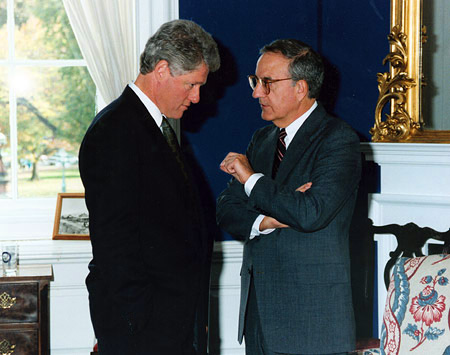
Was a titan really necessary to clean this up? Weren’t we told that the owners, not so long ago, were operating in the red and that the use of performance-enhancing drugs was a minor incident with limited applicability league wide? It makes we wonder if I was paying attention when the music stopped.
That’s Sue Selig, on the left, seated next to President Bush. I wonder what they’re not talking about.
W – at a time when he had fewer murders on his belt, but more alleged steroid users.
When these boys – y/our boys come of age, it is the lure of money, fame, legacy and more that propels them to make choices that are less than wise…choices that are not “good.” Like the drug dealing immigrant (or citizen) who sells drugs because he believes he is neither the source of the demand nor adequately prepared or even willing to do less lucrative work, the baseball player looks for an edge to compete. That drug dealer knows that if he unable to secure these precious few blocks, his sources of revenue will dry up. There will be no negotiation with the crew down the street and so the bullets fly. The bullets fly close to home because the dealer cannot gain access to the territory of his sponsor. So people die – but they don’t die where the drugs are consumed. They die close to home – where the drugs are sold. And half a world away, that head of state knows that without access to that precious sea outlet, his prospects for economic survival are nil. He also knows that he is playing the Most Dangerous Game (a favorite of Vice President Dick “Shoot Him In the Ass” Cheney). In this most dangerous game, he has no real options. If he does not fight he starves and dies a slow death. If he fights, he winds up living in a hole and at the end of a rope. If he fights, perhaps more than 650,000 of his countrymen will also lose their lives.
And so, each one makes a series of choices in which their fate is all but assured. Young major league baseball players (we may never know how many) risked a great deal to resurrect the game because the owners were unwilling to face the legitimate challenges of modernizing their business. Today, as one of those owners will spend the evening pinching himself about his $6 billion windfall, a position player will face his future against the full might of the United States of America.
And his fate is all but assured. Is it not?
“Those numbers are why most people who care about baseball wish that Bonds had never played and hope he never does again. The numbers, examined in the lurid light of what is known about the recent role of steroids and other performance-enhancing drugs in sports and about Bonds’s character and associations, invite suspicion and perhaps compel invidious conclusions.” – George F. Will, Washington Post, March 12, 2006 (italicized text for emphasis)
Imagine if we were all known by the company we kept.
